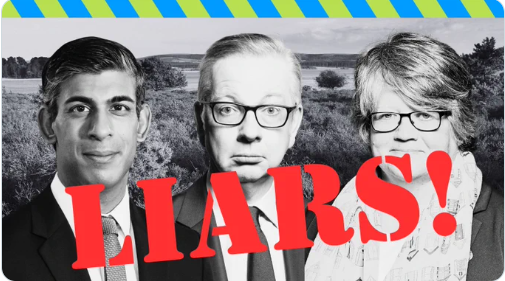
There has been a certain amount of interest in the government’s proposals to opt out of protections for water bodies this week. Quite a lot of the interest has been because of a tweet (see above) put out by the RSPB, or part of the RSPB, or at least someone in the RSPB, but we’ll get to that in a while because that is perhaps the most interesting aspect but it certainly isn’t the most important.
1. The Brexit legacy
This blog warned you in the Brexit campaign, at the time of the referendum, and often since then, that one of the consequences of Brexit would be a removal of environmental protection. What the Westminster government is now doing is just what many of us feared and predicted – but nobody likes a smart-arse so let’s not linger here. However, if we were still members of the EU then the current route to environmental degradation wouldn’t be feasible, and would be much more easily legally challenged.
2. What is the government doing?
This is the essence of the proposed change:
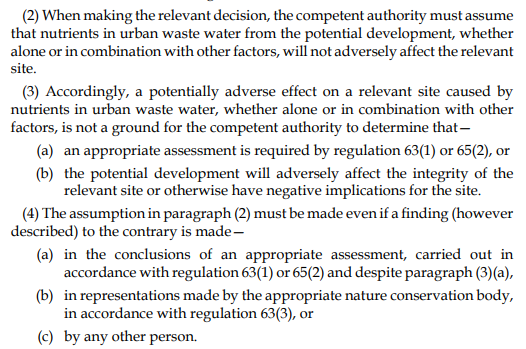
Clause 2 disbands existing protection; Clause 3 says don’t bother to check; Clause 4 says whatever the facts & advice, don’t take any notice of environmental impact. Pretty stark, pretty shameless and undoubtedly damaging to environmental quality unless other measures are brought in. The government says it will bring in some other measures but a) would you trust the people who said that they wouldn’t reduce environmental protection in the first place, and b) will such measures be funded and brought in quickly (if at all)?
Environmentalists are sceptical, to say the least, that any mitigating measures will exist and be adequate.
But environmentalists are well-known for being a bunch of leftie moaners (even those who are right wing moaners) so let’s discount their moaning completely (although I really wouldn’t) and go to the regulator-with-almost-no-teeth, the Office for Environmental Protection which is the guardian of our environment now we don’t have the European Commission and all those other EU entities to step in and say whoa! What do they say? And, obviously, it’s not the fault of the OEP and its staff and leadership that it has almost no teeth – that’s the fault of government too.
But the OEP says this – click here, of which these bits say what I’ve just written above:
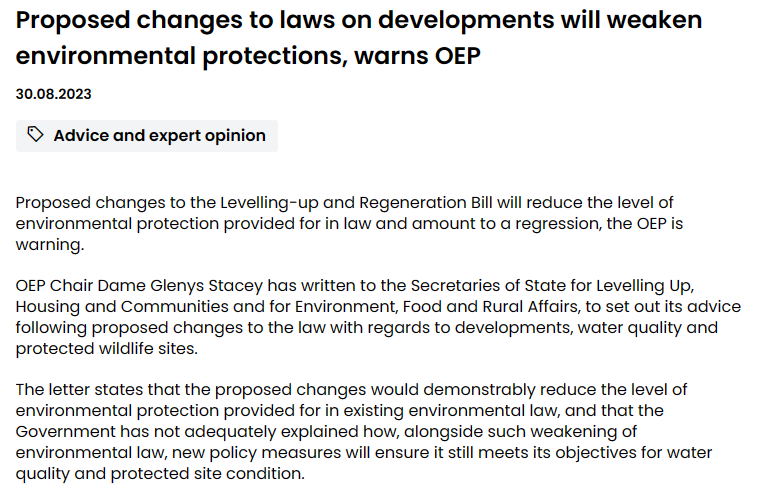
The OEP has also published a letter (30 Aug) to Michael Gove and Therese Coffey about what’s happening, and a response from Defra (31 Aug) and a response to that response (1 Sept) which says:
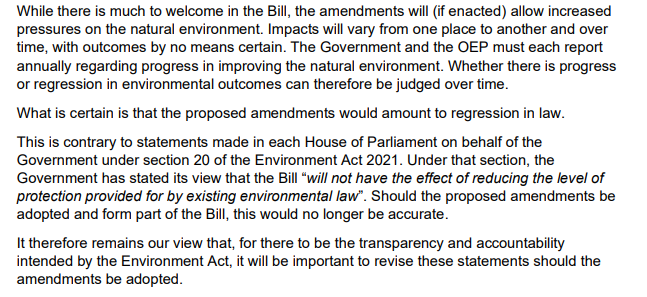
There is no doubt whatsoever that the OEP believes that the government plans break promises and reduce the level of environmental protection in an unacceptable way. That’s what all we leftie moaners think too, and quite a lot of right-wing moaners as well.
That is what is important – and that is the main issue.
3. The wildlife NGOs – The Wildlife Trusts
The Wildlife Trusts, especially (but not only) Craig Bennett, have played a blinder this week. Craig was on BBC Radio 4 Today on Tuesday morning (was it only Tuesday?) and said the right things strongly and clearly – you can listen here (just after 0730). Craig asked whether we should believe anything the government says – quite strong stuff. In fact he said of government ‘They lied. They lied to Parliament, they lied to the British people and I’m left this morning wondering why we should believe any environmental promises Rishi Sunak ‘s government makes.‘. This was a man, or an organisation, that has come to the end of its tether with a government that doesn’t deliver for the environment and whose word is worth so little.
Here’s Craig reflecting on the past few days – click here – although not on the next few days and weeks.
Well done Wildlife Trusts! You could have twigged a bit sooner, but well done.
4. The wildlife NGOs – The RSPB
Let’s just remind ourselves of this tweet – although no-one will easily forget it with its 9.8m views on Twitter so far and media coverage to boot;

This went out with some appropriate text on Wednesday and took the world by surprise. Was this the rather staid and cautious RSPB? Wow!
I have to say that it took my breath away when I saw it (several hours after it was posted – I don’t live in the Twittersphere you know). Having been in a hot seat for 12 years as RSPB Conservation Director I was left wondering whether I would have done that were I there now. I was left hoping that I would have done but not being completely sure. I was still wondering when this came from the RSPB:
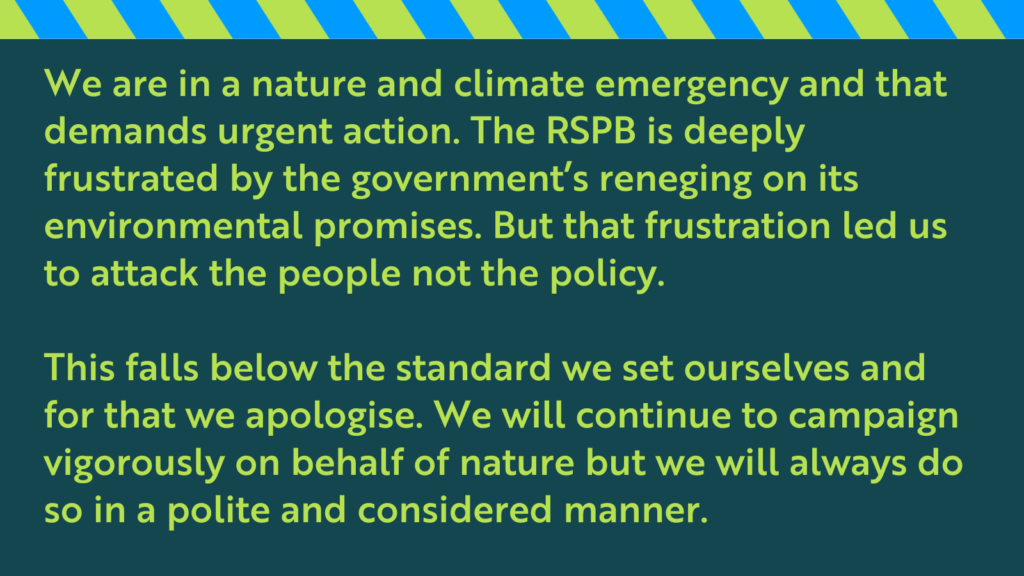
When the RSPB’s CEO, Beccy Speight, went on BBC Radio 4 Today on Thursday morning she put up a very strong performance. Again, I’ve done a few of those things and it’s more fun attacking the government than defending your own organisation’s alleged misdoings or weaknesses, but both go with the territory – listen here at about 0750 – the peak listening slot! Beccy did very well and said a lot about the key issue.
Nick Robinson did only an average, or below average, job in asking the questions. Charities can make political statements – they are doing it all the time. Nick misunderstands charity law, as do lots of others, if he thinks they can’t. He also asked about a tweet from someone in the RSPB Parliamentary team which was way off the mark. I can think of former members of that team who have belonged to at least four political parties (Con, Lab, LibDem and Green) and there may well be some others too for all I know, but they were working for the RSPB while doing their jobs, and did so with consummate professionalism. In populating a parliamentary team, you do tend to get people who are interested in politics, funnily enough. But where Mr Robinson got it right was in asking Beccy whether she had seen the tweet before it went out, and after ducking the question she said she hadn’t. That was quite clear, and rather important.
I believe I know the identity of the individual who put out that tweet (and if right, I know the individual too). We are left wondering whether they put it out without seeking any clearance from the layers of management above, or whether it was signed off at a level below the CEO. I don’t know. The RSPB must know but I’m not surprised that they aren’t very forthcoming. Depending on quite what happened I can see why the RSPB management and probably Council might have been a bit Rabbit-like in the headlights of the glare of publicity that tweet produced. As a CEO, on a nice summer’s day, you don’t really want to have scores of calls and emails from the media, your Council, friends, others in the organisation and outside asking you what you knew and what you are going to do about it. It goes with the territory though. But the original tweet should have been cleared at a very high level and it was a failure of internal systems or judgement if it wasn’t. Under those circumstances it isn’t surprising that the apology came. This wasn’t, it seems, the RSPB regretting a decision it had made, it was, it seems, the RSPB correcting an action that it had never decided to make. That tweet was not the RSPB’s corporate voice, it seems, however much millions of us admired it.
Was the RSPB right to apologise? Maybe, but I think not. The tweet said what the Wildlife Trusts had said – just even better! It was pointed at individuals – but at the individuals with the responsibility for the government policy position (just as the Wildlife Trusts had). It was bold and very welcome. Would it have gone out if it had been seen by those who would have to carry the can for it? We can speculate that it wouldn’t have done, but we don’t know.
There are a few other bits and pieces on this. The right wing press have used this to denigrate the RSPB for being a hotbed of lefties – they’ve done the same to the National Trust quite often so this conjures up an interesting view on where the left starts and finishes – ignore it! There are always those who say that the RSPB did something because of pressure from the Royal Family (that R in the name!) and I’ve seen some such suggestions this week, which are so fanciful as to be laughable. There is the view that a single Council member who went on Twitter saying that he was troubled by this business got the RSPB to apologise – I’m sure he didn’t. He, Ben Caldecott, was doing his job as a trustee (the governing body of the charity) in expressing concerns about anything he was concerned about, but he didn’t do it in a very supportive or classy way by posting it on Twitter. I’m sure he wasn’t the only trustee who was keen to know what was happening – there would have been a few hours when many people within the RSPB were asking ‘What’s happening?’.
5. The Wildlife NGOs – what next?
So, what next? How will the wildlife NGOs fight the reduction in environmental protection? How should they deal with a lying government – for such it is? What’s the plan, for there is much to do?
So there we have it – the week when the sewage hit the fan. The Brexit legacy, the nuts and bolts of what is planned and the wildlife NGOs’ responses. I imagine some RSPB Council members and senior managers sitting in a bar on a Scottish island, maybe having seen some Choughs, with much-needed large Lagavulins in hand and discussing what a week it has been. This is just the beginning.
[registration_form]
Thank you Mark. A clear explanation of what happened. Personally I don’t think the RSPB should have apologised; has the Govt. apologised for breaking the Manifesto pledge? Thought not….
It doesn’t necessarily break their manifesto pledge. It all depends what other protections they put in place.
Ha! Would anyone still be talking about that tweet if the RSPB had not issued an apologetic withdrawal?
Am of the view that the RSPB was certainly within their rights (morally) to communicate that the three individuals, in their professional capacities, are liars, and I would argue that the RSPB had a responsibility to communicate this too. Am certainly more disappointed that they apologised than the original act.
This also rather puts the RSPB in a bind come the inevitable demand, if there is sufficient political time before a General Election, for species legislation to be weakened or removed. What would the RSPB say if Government diluted laws around say Schedule 1 breeding birds? Could they call out the Government as liars? No! They might feel comfortable about issuing a strongly worded tweet with a GIF of a displeased person waggling their finger or shaking a fist though.
If an organisation with > 1 million members can’t call out liars and defend nature, giving biodiversity a voice, then perhaps I’m wasting my membership money?
Money talks…a language which perhaps Therese Coffey, Rishi Sunak and Michael Gove appreciate.
Thanks Mark,
I’m surprised you didn’t mention the fact that the Trustee who complained, in a very public way about the tweet, is a senior fellow at Policy Exchange, a “Tufton Street” think tank which was co-founded by Levelling up Minister Michael Gove – the very Minister who announced plans to ditch a significant piece of environmental legislation.
Caldecott also worked for said think tank previously. Let’s assume he’s quite close to Gove.
Are we absolutely sure that he acted purely in his capacity as an RSPB Trustee wishing only that the charity operates to high standards and meets the legal requirements for political campaigning?
Miles – I’m not sure, no. But then I can’t tell from the outside. As I said in the blog – it wasn’t a very supportive or classy way to behave as a trustee with concerns.
But all organisations, certainly all big charities, have to have a range of views on their boards. It is sometimes called diversity, and sometimes thought of as being about gender, ethnicity and/or age, but if you have a diverse governing body then you will have a variety of views on your board (you know that0. The idea that one trustee can bring about big change is unconvincing and unwise. The RSPB has a highly experienced and competent Chair in Kevin Cox and I would have a lot of confidence in him taking a view across all trustees on any important matter. Most RSPB Council members come away slightly frustrated that their lone voice doesn’t carry much weight!
I can’t speak about what it is like now, but in the olden days the grouse moor owner on RSPB Council didn’t dictate RSPB policy on anything but was a valued sounding board. Likewise a bunch of landowners and farmers. But you know all that.
As with previous efforts to ‘streamline the planning process’, this is part of a government deceit that environmental controls are the cause of the housing crisis. The large number of unfulfilled planning permissions suggests that – if it plays a part at all – this is far from the only factor. House builders are not interested in building when prices are low. When houses are built the agreed numbers of ‘affordable’ homes are often not fulfilled and those that are are often only ‘affordable’ to the relatively well-off.
It is also part of a wider tendency to paint all environmental protections as an economic drag. Under all of its leaders since Cameron the government has made a variety of promises to improve the environment but whenever economic and commercial needs come into conflict with the environment the commercial interest invariably wins out. Sunak has made his personal lack of interest in the environment very clear.
I also wonder how this proposed amendment, if passed as written, avoid conflict with Chapter 1 of the Environment Act 2021, particularly Section 8 (Environmental Improvement Plans)? And no doubt other sections which I don’t have time to research.
I think the actual motive for this amendment is to dare Labour (and opposition parties) to vote against it…which seems an obvious thing to do. But in doing so, Labour can then be charged with voting against housebuilding. In the run up to a General Election where the Tories are double-digit points behind in the polls, there is all to play for, even if it is a crap strategy.
So Labour has a dilemma, vote against, which would be the moral and sensible thing to do, but guarantee accusations of undermining housebuilding efforts, or abstain/ vote for, to avoid the vitriol.
This may well be Phase 1 of a strategy to create narratives painting Labour as anti this and anti that, such that during the General Election, campaigns are focussed on, in this instance, Labour’s record of voting ‘against housebuilding’, when the reality would be that they voted against (if they did) removing environmental protections.
I doubt the nutrient neutrality rules have (and may be had) much economic negative effects on major housebuilders profit margins. And in my part of the world (Yorkshire), there is saying that where there is muck, there’s brass. A burgeoning free market (which I thought the Tories were all for) was developing that offered and enabled developers to pay for the mitigation required, thus neutralising the apparent blockage in the pipeline of houses to be built.
This amendment stinks, and I am not talking about the effluent that has emerged from the orifices (take your pick) of Messers Sunak, Coffey and Gove. It stinks of the political strategy that will become the skid mark of this General Election.
From November this year new developments have to increase biodiversity by 10%
Comedian Mark Steel talked about the newly-radical RSPB in the first few minutes of the latest episode of his podcast “What the F*** is going on?”
https://podcasts.apple.com/gb/podcast/what-the-f-is-going-on-with-mark-steel-ep-96/id1573424189?i=1000626526992
(contains strong language!)
Out of interest are you nutrient neutral Mark? And if not do you think you should have to be? Or just people who buy new builds?
Out of interest, Giles, are you (nutrient neutral)?
We don’t have to be because our house was built in late 15th century. Sewage wise we have a septic tank with a soak away. I’m not sure how much gets into the river which is 200ft down the valley. Our fields are all organic and we never spread slurry. We do try and mitigate by cutting and removing grass either for hay or for compost. Hay goes for animal feed so I guess making that increases nutrients elsewhere but reduces nutrients in the soil here.
All very interesting. I think Beccy was right to apologize and I think that by attacking the government policy rather than individual ministers the Wildlife Trusts got it right, as did Beccy on the radio.
Good article by Matthew Parris in the Times, putting the boot in on Gove in particular. We all knew that Brexit would lead to this. The referendum was won with lies so it’s no surprise that what was promised is not being delivered. So, what will Starmer do? He’s desperate not to upset anyone. Which way will he think the wind is blowing I wonder.
The government is also floating the idea of ditching/severely changing other environmental and climate related stuff. Like those pesky EPC ratings on houses.
Thank you Mark for a considered blog and enjoyably understated blog. Couple of minor points worth noting.
The RSPB may have apologised for the RSPB England tweet but it hasn’t been deleted – which, if this remains the case, seems quite a balanced outcome for an incendiary (but very welcome) tweet that hadn’t been through the proper authorisations. (RSPB Cymru and Scotland (and possibly NI too, can’t remember) came out in support of the “Liars” tweet – but those tweets do seem to have disappeared.)
It has been widely noted that the shares of the main housebuilding companies in England rose significantly (by c. £500,000,000) after the government’s announcement and that these same companies are significant donors to the Conservative Party, whilst the cost of dealing with pollution from new house building has been moved to the taxpayer.
and of course all the new houses they say we need has nothing to do with the size of the population in this country, not the primary driver or anything, not a cause of damage to nature
All governments despite pledging to protect biodiverity prioritise housing and infrastructure for a growing population which on a global scale is 82 million per annum. Meanwhile the planet remains the same size.
Thanks for putting the issues together so comprehensively, eloquently and succinctly Mark – allowed me to catch up on a kerfuffle that was on the periphery of my consciousness! I watched Craig Bennett’s video on X-twitter, thanks for the link, and he was superb. It was one of those videos that you wish everybody in the country could be forced to sit down watch and listen to at the same time. He really underlined what nasty liars and manipulators the housebuilders are.
I was not surprised to hear the farming sector is now looking to follow the housebuilders re the bar being lowered on what crap can get into our rivers, although given the number of river pollution incidents being traced back to farming it seems they jumped the queue and weren’t that bothered about regulations in the first place. In 1990 I was at a conservation seminar where the director of an agricultural college told us that “99% of farmers are conservationists”, the subsequent years have only bolstered my observation then this was likely bull shite and listening to the NFU and ilk repeating it is increasingly hard to stomach.
Thanks so much for the blog..I believe the criticism of the 3 ministers was acceptable. You can’t criticise policies in isolation – policies originate from ministers. They receive civil service advice and are supported by political advisers (SPAD’s) and they have their own opinions.
Ministers are culpable, the problem is they won’t accept responsibility. They always shift the focus on “lefties”, whether environmental charity members or lawyers.
The sooner a General Election happens, the better. I can only hope that something unforeseen happens and brings it about very much sooner than expected.
I think that the “LIARS” tweet is brilliant in many ways because using just one word it sums up what so many nature enthusiasts think almost every day. It is so unlike the RSPB’s normal measured style of communication that it certainly got the attention that it deserved. Probably a few internal protocols were broken. To then apologise for the tweet has greatly multiplied interest in it, but not to remove it completely allows that interest to grow further. I doubt that was the plan, but mostly it has worked to the RSPB’s advantage.
In a former life I spent 20 years as a Communications Director in the travel industry and at times the BBC Radio 4 “Today” studio felt a bit like my second home. Occasionally we had to get tough with Government, and my CEO gave me a lot of slack and occasionally I’d give a Government Minister a bloody nose. My CEO would be absolutely delighted, while also calling the wounded politician to say “I’m sorry about Keith, I’ll have a word with him”. You can get away with it occasionally, but not if it becomes your normal style of communication. I’m sure the RSPB understands this well, even if someone on the comms team spent a day on the naughty step.
37 houses are being built in our village and a large attenuation pond has been dug to capture the surface water run-off. Is this a more common condition for house-builders now? I know they put them in when they build roads
Nice to see a challenge made, that our nature cannot. I had a planning issue fighting for nature, that was turned down so nature lost, interesting at the time neither the Wildlife Trust or the RSPB would support. But they where interested in some of the site becoming a wildlife heaven, needless to say it is not at present, just being left with a diminishing amount of wildlife, due to no maintenance having been carried out for over 5 years. Although change is happening as the rare ecosystem is changing.